SBC releases abuse study—condemning past practices and recommending new protections—ahead of the annual meeting in Birmingham.
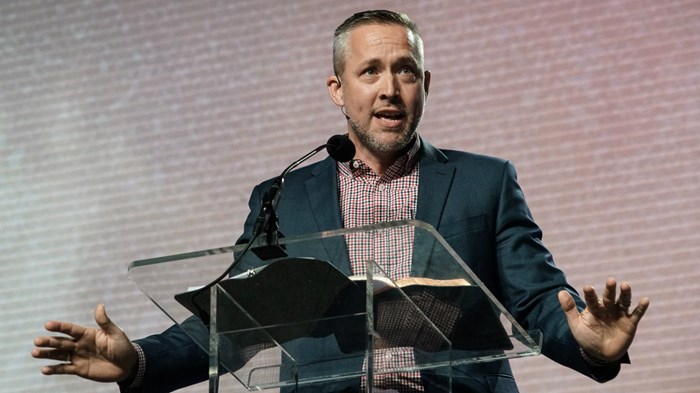
Image: Baptist Press
SBC president J. D. Greear appointed a sexual abuse advisory group last year.
ASouthern Baptist Convention report on sexual abuse—released Saturday as the culmination of a year of study, listening sessions, and expert consultation—begins with the story of a woman who was sexually abused by her youth minister and pastor starting at age 14, at a church outside Birmingham, Alabama.
Susan Codone, one of more than a dozen survivors whose personal accounts appear in the report, calls herself “living proof that sexual abuse has been overlooked for many years in Southern Baptist churches” and declares the crisis “an epidemic powered by a culture of our own making.”
The 52-page document details the practical and theological failures of SBC churches and recommends a more rigorous response to prevent predatory behavior and “care well” for victims.
It is seen as a major first step to a denomination-wide movement around addressing abuse. What will come next depends, in part, on what happens in Birmingham this week, as thousands gather in Codone’s hometown for the convention’s annual meeting.
The issue of sexual abuse looms large, the subject of ancillary events, outside protests, and official business. The messengers are slated to vote on a proposed amendment to specifically name mishandling sexual abuse as grounds for disfellowshiping a church and may task a new committee to handle claims of misconduct by SBC churches.
President J. D. Greear commissioned the sexual abuse advisory group following his election last summer; the group was responsible for the recent report as well as a free curriculum for churches. He will present their findings officially on Wednesday.
The report’s tone reflects the kind of frank acknowledgement of the problem recently modeled by Greear and other top SBC leaders—including Ethics and Religious Liberty Commission president Russell Moore and Southern Baptist Theological Seminary president Albert Mohler—and incorporates directed critiques from survivors and advocates involved in the advisory group—including attorney-advocate Rachael Denhollander and abuse survivor and Southeastern Baptist Theological Seminary alumna Megan Lively. (Both are profiled among the 10 women changing the SBC response to abuse featured in CT’s June issue.)
In one section, the authors state, “We recognize failures have occurred in many ways, including:
- Failing to adequately train our staff and volunteers—on the national, state, and congregational levels—to be aware of and respond appropriately to abuse
- Using church autonomy improperly to avoid taking appropriate action
- Failing to care well for survivors of abuse
- Failing to take disclosure seriously and to believe the survivor
- Failing to report abuse to civil authorities
- Recommending suspected perpetrators to new employment
- Promoting political, institutional, and congregational leaders whose language and behavior glorifies mistreatment of women and children.”
After a major Houston Chronicle investigation found credible abuse allegations against 380 SBC church leaders earlier this year, more from within the denomination began to push back against the common defense that because SBC churches are independent and autonomous, the convention could not address abuse among them.
The report owns the denomination’s position in repenting of its mistakes and building better systems to respond to abuse. North American Mission Board president Kevin Ezell stated that the SBC had “sometimes hid behind our autonomy,” but “we’ve waited way too long and the time is now to act.”
The advisory group’s report also goes deeper than previous statements on the subject; the report names “theological misapplications” seen as factors behind insufficient and harmful responses to abuse.
The list includes “wrong teaching that leads to treatment of women and children as inferior to men in value, intellect, and discernment” and “misapplication of complementarian teaching, leading to women submitting to headship of all men” as minimizing the sin of abuse, rushing to restore perpetrators, and suggesting victims might be to blame.
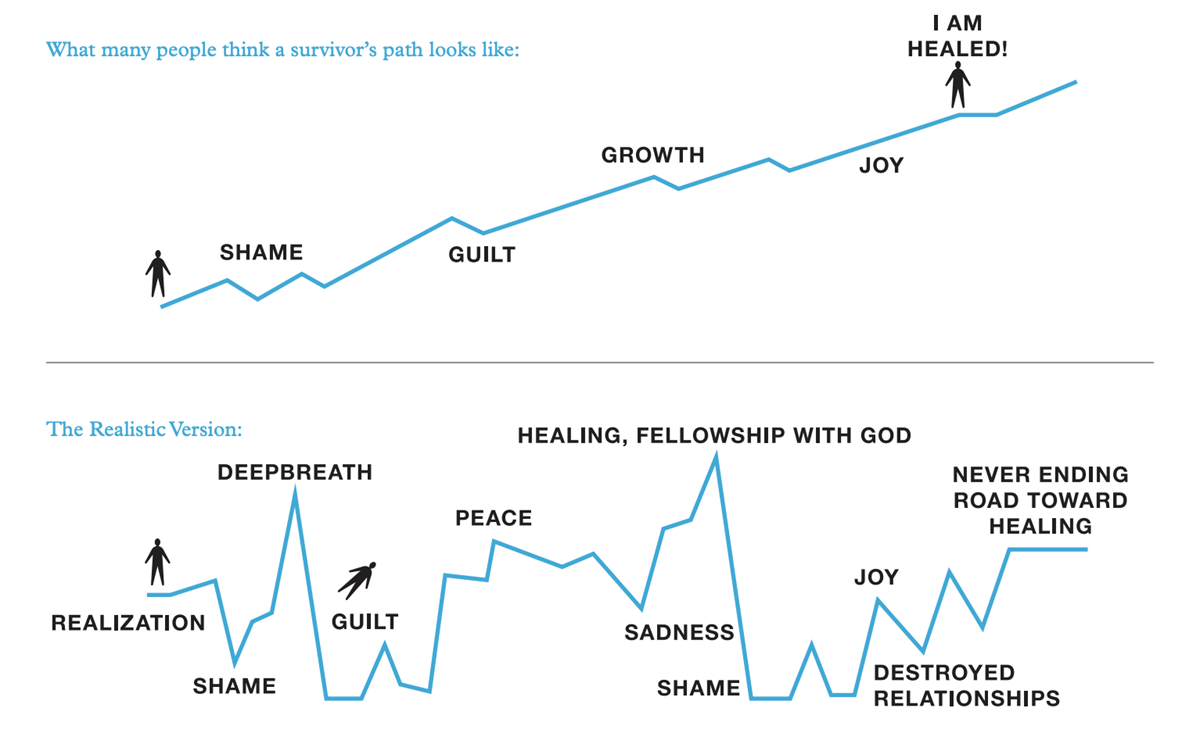
Image: Caring Well / SBC
The report also condemns sexual relationships between pastors and members of their congregations as an abuse of power—a position written into law in the 13 states where clergy, like counselors, doctors, and other professionals, are barred from sleeping with their clients.
“Clergy abuse not only encompasses abuse to children, but also a ‘consensual’ adult sexual relationship between a clergy member and a congregant. The power and spiritual influence that a member of the clergy wields over their congregants essentially renders consent impossible,” the SBC report stated. “They often get the benefit of the doubt as spiritual leaders, can leverage their positions of power to manipulate others, can play the victim card if they are caught, and can spiritualize the situation to minimize personal responsibility.”
In sections on practical ways to improve abuse responses, the advisory group describes warning signs around people who may be grooming the church by pushing boundaries and recommends rules to minimize the risk of abuse: barring one-on-one settings in the church or transportation; requiring doors remain open; requiring volunteer screening beyond background checks; and avoiding sexual humor or innuendo.
The report follows a LifeWay survey on Protestants’ perceptions of abuse in church contexts; around a third believed there were “many more” abusive pastors yet to be found out. According to the survey, 10 percent of churchgoers under 35 and 5 percent of churchgoers overall had left a church because they felt sexual misconduct was not taken seriously.
The issue may be stirring involvement, concern, and prayer among younger Southern Baptists in particular. This is the second year in a row that women speaking out about abuse stand to shape the annual meeting; last year’s came just weeks after Paige Patterson’s resignation. Messenger attendance nearly doubled in 2018, with significant growth among first-time attendees and younger members.
“Though sexual abuse has rocked the SBC, I believe more progress has been made during the last 12 months in Christian transparency, gender equality, and Gospel fidelity than during the last 40 years combined,” tweeted Wade Burleson, a pastor and blogger who has critiqued aspects of the SBC for years, including Patterson’s leadership. “Brokenness brings repentance.”
Survivors have expressed disappointment that it took the #MeToo movement and attention from secular media for them to see significant momentum around reform in the SBC.
Over the weekend, many pastors and messengers headed to the annual meeting shared the new report on Twitter.
“This Caring Well report is tough reading,” wrote Malcolm Yarnell, theology professor at Southwestern Baptist Theological Seminary. “But the epidemic trauma caused by the evil of sexual abuse cannot be overcome through denial, ignorance, and changing the subject. Let us read, weep, become better informed, and change.”
The sexual abuse study group will continue to assess denominational responses as it enters the second year of a two-year, $250,000 project. According to an update posted earlier this year, the group will evaluate the possibility of a creating database of known predators, requiring background checks for SBC appointees, and adding survey questions on abuse incidents to the Annual Church Profile (ACP).
Churches can commit to implementing the strategies set forth in the report by signing up at CaringWell.com.
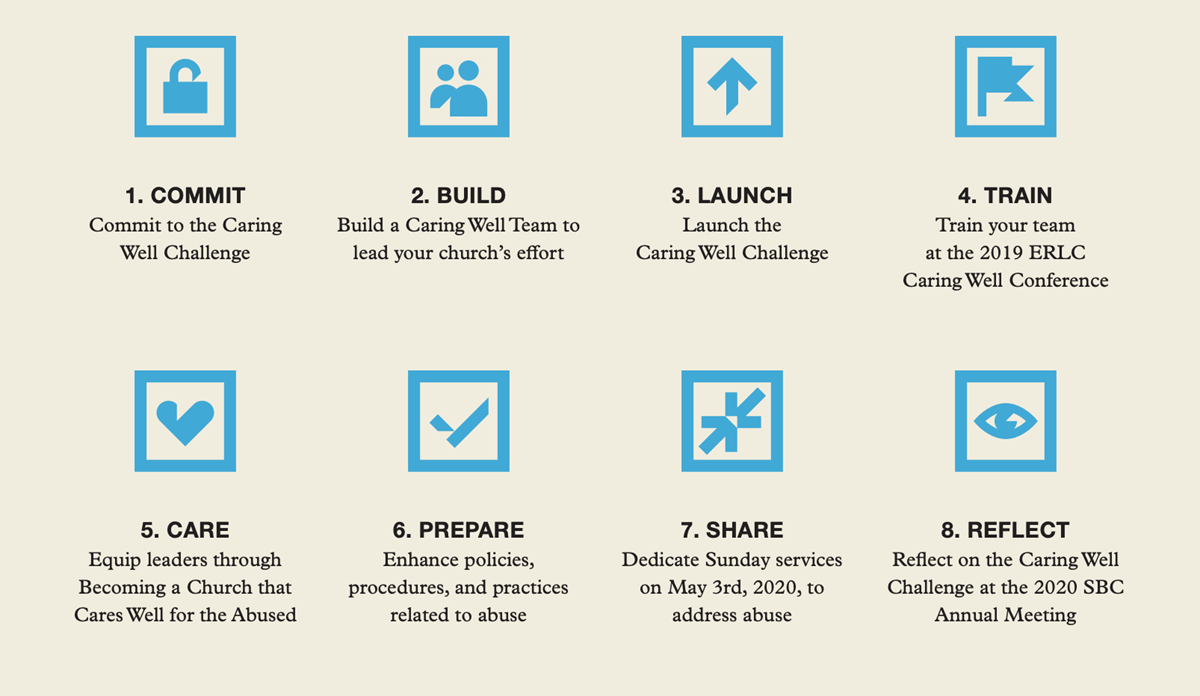
Image: Caring Well / SBC
President J. D. Greear wants 10 churches investigated; Executive Committee subgroup wants only 3. But both agree on Sovereign Grace.
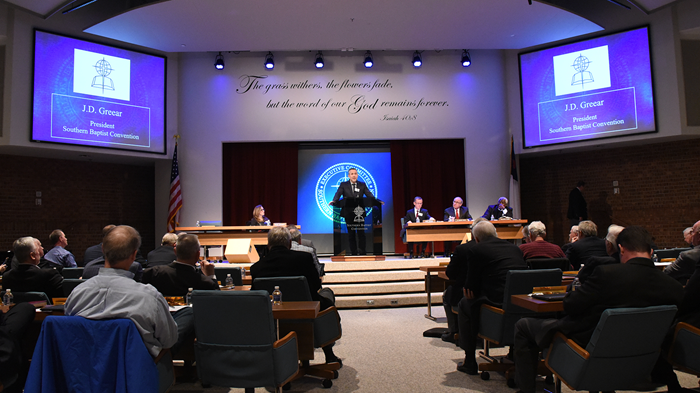
Image: Morris Abernathy / Baptist Press
Update (March 4): The head of the Southern Baptist subcommittee tasked with reviewing 10 churches for possible violations of denominational standards regarding abuse resigned on Friday, according to a Houston Chronicle report. Ken Alford cited “controversy and angst” over the bylaws workgroup’s response, but defended their position, saying their small group was not equipped to investigate the churches further.
-----------
Conflicting statements from Southern Baptist Convention (SBC) leaders on the denomination’s approach to addressing sexual abuse have left victims, advocates, and pastors themselves with a sense of whiplash—and called into question the fate of proposed reforms to improve accountability among SBC churches.
Those concerned about abuse within America’s largest Protestant body—including the hundreds of cases reported by the Houston Chronicle and San Antonio Express-News—cheered repentant statements and bold plans for policy changes from SBC president J. D. Greear last week, only to see his recommendations largely turned down by part of the SBC’s Executive Committee days later.
Greear called on the Executive Committee (EC), the decision-making body tasked with addressing convention business between annual meetings, to take a harder line against churches that mishandle abuse allegations. Specifically, he wanted the SBC to look into 10 particular churches implicated in the recent investigation to see if the churches still meet denominational standards.
Though Southern Baptists have generally resisted top-down oversight, several prominent SBC leaders, including Greear and Ethics and Religious Liberty Commission president Russell Moore, had begun to say that a commitment to church autonomy could not supersede their responsibility to prevent and address abuse.
But when it came to the 10 churches in question, the executive committee’s bylaws workgroup declared that 7 did not have credible claims of wrongdoing to investigate in the first place, reasoning that the churches didn’t merit further review and admonishing SBC leaders against calling for inquiries without criminal convictions and evidence that churches had knowingly permitted predators in their midst.
“I am deeply grieved at the SBC EC response to JD Greear. The EC has demonstrated the exact problems that lead to the abuse of so many—whitewashing the crimes and coverup, choosing largely irrelevant criteria, and investigating issues they have no training to investigate,” tweeted Rachael Denhollander, an attorney and victims’ advocate who was appointed to an SBC presidential advisory group tasked with studying its response to abuse.
“JD Greear and some leaders have been seeking expert/survivor help and moving forward with firm first steps to change. The EC has undermined and destroyed that effort. I hope these mistakes are due to lack of learning and that they will withdraw, seek help, and remedy these errors.”
After a two-day meeting, the six-person EC subcommittee released a statement last Saturday tempering Greear’s charge. “The Convention, through its Executive Committee, should not disrupt the ministries of its churches by launching an inquiry until it has received credible information that the church has knowingly acted wrongfully,” the subcommittee concluded.
“Although the overwhelming majority of sexual abuse cases remains tragically unreported, in virtually all reported cases, the abuse and cover-up of abuse were criminal acts undertaken by a few individuals within a church,” the group wrote. “The church body rarely knew about these actions and even more rarely took any action to endorse or affirm the wrongful acts or the actors themselves.”
(The three churches the workgroup deemed to require further inquiry included Sovereign Grace Church in Louisville, where concerns of abuse coverup have swirled around former Sovereign Grace Ministries president C. J. Mahaney for years.)
Their remarks sent waves across the SBC, including among fellow members of the executive committee who hadn’t been involved in crafting the response.
Ed Stetzer, executive director of the Billy Graham Center at Wheaton College, called outthe bylaws workgroup for hasty decision-making and an “arbitrarily high standard for inquiry.”
“Assessing these situations typically takes months or, in some cases, years. Now, suddenly, a Baptist committee is able to consider six churches in just over 24 hours and declare them all open and shut cases?” wrote Stetzer, former president of LifeWay Research. “You can see why some may not feel that due diligence was done.”
At least three EC members spoke up online to decry the workgroup’s statement and pledged to advocate for victims before the denominational body: EC vice chairman and California pastor Rolland Slade, Florida pastor Rick Wheeler, and Texas pastor Jared Wellman, who tweeted, “I am a member of the EC who supports @jdgreear’s “10 Calls to Action on Sexual Abuse,” and I want to make sure sexual abuse victims’ voice is heard regarding the recent Bylaws Workgroup report.” They fielded emails from SBC abuse victims about their experience and recommendations for improvement.
After condemned the EC statement for “undermining efforts” and “dismissing coverups and abuse brought to light,” Megan Lively said she appreciated Wellman for hearing out stories like hers.
Lively came forward last year to recount how Southern Baptist leader Paige Patterson discouraged her from reporting an alleged instance of rape while she studied at Southeastern Baptist Theological Seminary; Patterson was later fired from his post as president of another SBC seminary.
The bylaws working group statement reflects the concerns of SBC leaders who don’t want to see the convention come to hasty conclusions or presume guilt after every allegation, which they say would be “untenable and unscriptural.”
The voices critiquing the statement want to see an approach that centers more around the victims—trusting their stories and enabling them to come forward so abuse can be addressed.
“The SBC EC has bowed to political expediency over biblical principles in their hasty & unwise decision to minimize & marginalize & reenact the pain of the victims, in order to assuage the wrath of the accused, alleged violators,” wrote SBC pastor Dwight McKissic. “Same mindset undergirded slavery/Jim Crow in SBC.”
Dean Inserra, a member of the ERLC leadership council, quipped: “SBC EC, I’ll help you out real quick with a new response to President Greear’s calls to action: ‘Whatever it takes.’ Try that.”
The unpopular response to Greear’s recommendations reflects differing philosophies within the denomination over whether or how the SBC could improve its response to abuse. Such a split would challenge whether new policies go forward, including a proposed amendment to explicitly call out churches that harbor abuses as grounds for disfellowshiping. (It has to be approved two years in a row to be ratified.)
As the Twitter account SBC Explainer wrote:
The amendment will now go to the Messengers for consideration. The debate will ensue. The Convention will act according to the messengers. What we do in years to come will in large part depend on who shows up, debates + votes this, and votes for president in years to come. #SBC19Lastly, it really can’t be understated how possible it is that the Convention fails to pass any amendment whatsoever. The 2/3 vote is a purposefully high threshold. What a shame on us all if we fail to act at #SBC19. Public debate needs to start. We need to get on the same page.
Other recommendations from the advisory group appointed by Greear include urging churches, associations, state conventions, and entities to strengthen abuse policies; considering background checks for SBC appointees; and weighing the possibility of a database of offenders.
President J. D. Greear announces a batch of new proposals, reiterating that congregations that cover up incidents have “no place” in the SBC.
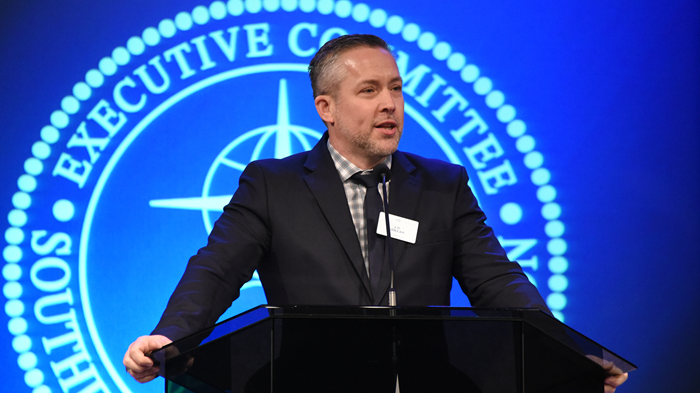
Image: Morris Abernathy / Baptist Press
After a Houston Chronicle investigation uncovered hundreds of instances of criminal sexual abuse within its churches, Southern Baptist Convention (SBC) president J. D. Greear said the denomination needs to “repent of a culture that has made abuse, cover-ups, and evading accountability far too easy.”
Already, Southern Baptists are taking action to change their church culture, debuting this week new policies and plans to improve organizational awareness of abuse cases and train leaders to address them.
The news report drew particular attention to at least 35 pastors and volunteers who continued to work in Southern Baptist churches after being convicted or credibly accused of sexual misconduct.
At a meeting of the SBC executive committee on Monday, Greear called on the denomination to examine 10 churches who were “alleged to have displayed a wanton disregard for the seriousness of abuse” to see if they indeed meet the standards for SBC churches set forth in the Baptist Faith and Message.
Notably, the list includes Houston’s Second Baptist Church (in recent years, the third-biggest church in the SBC) and Sovereign Grace Church of Louisville, where C. J. Mahaney is senior pastor.
While the SBC can remove churches that harbor predators under its existing policy, the committee wants to now explicitly name mishandling of abuse as grounds for expulsion. If approved by the delegation at the SBC Annual Meeting this year and next year (amendments require two consecutive votes), this requirement will be added to the SBC Constitution as one of the qualifications for churches:
Has not been determined by the Executive Committee to have evidenced indifference in addressing sexual abuse that targets minors and other vulnerable persons and in caring for persons who have suffered because of sexual abuse.Indifference can be evidenced by, among other things, (a) employing a convicted sex offender, (b) allowing a convicted sex offender to work as a volunteer in contact with minors, (c) continuing to employ a person who unlawfully concealed from law enforcement information regarding the sexual abuse of any person by an employee or volunteer of the church, or (d) willfully disregarding compliance with mandatory child abuse reporting laws.
Greear had told CNN that churches that protect abusers “have no place in our convention” and that “because of the God that we believe in and that we worship, [Southern Baptist churches] ought to be safe places for the vulnerable, and predators ought to have no place in our midst.”
The denomination may also ask individual churches about their abuse policies and any instances of abuse for the Annual Church Profile, which measures congregational membership trends year-over-year.
Greear also announced further new policies and proposals based on recommendations from a study group on sexual abuse he commissioned after his election last June, in the wake of a wave of #MeToo allegations against SBC leaders.
All SBC seminaries will now require students to undergo training on caring for abuse survivors. State conventions have also agreed to integrate further abuse training. (The SBC is preparing to launch a free curriculum created by members of the study group, including survivor advocate Rachael Denhollander and trauma psychologist Diane Langberg.)
The SBC is considering requiring background checks for denominational leaders and has urged churches to include such screening in the ordination process. The study group is still weighing options for a possible database of offenders.
Denhollander, famous for her testimony against abusive gymnastics doctor Larry Nassar and her continued advocacy for victims in the church, said it’s been “encouraging” to work on the SBC study group.
After years of speaking out against abuse cover-ups at Sovereign Grace Ministries (now Sovereign Grace Churches), she also commended Albert Mohler’s recent statement that he regretted his past support of C. J. Mahaney, who was president of SGM and pastor of the church where the alleged incidents took place.
“I frankly was not equipped to sift through the allegations and did not grasp the situation, and I am responsible for that and for not seeking the counsel of those who were,” the Southern Baptist Theological Seminary president said, reiterating a call for Mahaney to step down until an independent investigation has taken place.
“To the survivors who were hurt by my errors, please know how grieved I am.”
In addition to recommending stronger language around disfellowshiping churches over abuse, the SBC executive committee on Tuesday also endorsed a recommendation to do the same for instances of racism.
Baptist Press reported that the proposed amendment would “deem a church not ‘in friendly cooperation with the Convention’” (in other words, not a part of the SBC) if it has “acted to affirm, approve, or endorse discriminatory behavior on the basis of ethnicity.” The SBC broke ties with a Georgia church last year in what was believed to be the first instance of a church being disfellowshiped on the grounds of racism.
The Houston Chronicle and San Antonio Express-News collect 380 allegations spanning 20 states in an unprecedented look at sexual misconduct across the denomination.
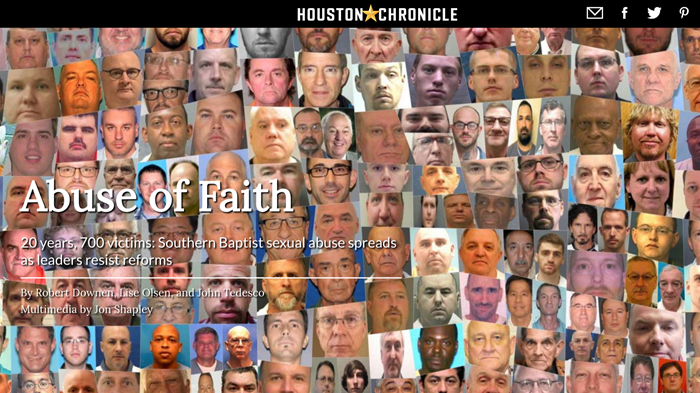
Image: Houston Chronicle
Alandmark investigation into hundreds of cases of sexual abuse in Southern Baptist churches opened with a collage of pictures of the offenders, row after row of headshots and mugshots of men who had been accused of abusing a total of 700 victims over the past 20 years.
In Sunday’s report, the Houston Chronicleand San Antonio Express-News were able to do what victims say the nation’s largest Protestant denomination has failed to for years: provide a picture of the extent of the abuse within the Southern Baptist Convention and a database of those found guilty of their crimes.
With allegations against 380 church leaders in 20 states (a majority of whom were convicted or took plea deals), it’s believed to be the biggest report on sexual abuse among Southern Baptists in the movement’s history. The report confronts the longstanding defense that the organization can only do so much to monitor abuse since affiliated congregations operate autonomously.
Another set of pictures captures a sense of the impact of abusers in Southern Baptist congregations. In response to the investigation, Southern Baptist women and fellow Christians shared childhood photos on Twitter from the age when they first suffered abuse.
Dozens joined a thread started by Living Proof Ministries founder and popular Bible teacher Beth Moore, including advocate and abuse survivor Jules Woodson and other ministry leaders.
Over the past couple years, the #MeToo campaign has raised awareness about abuse within the SBC and galvanized official efforts to improve the denomination’s response. Last December, as the Fort Worth Star-Telegram rounded up more than 400 allegations among independent Baptists, the Ethics and Religious Liberty Commission (ERLC) executive vice president Philip Bethancourt wrote, “it would not be surprising if journalists are working on a similar type of story focused on Southern Baptist churches as well.”
That day has come. TheHouston Chronicle and San Antonio Express-News revealed in the first of a three-part series that more than 200 Southern Baptist abusers were convicted or took plea deals for their crimes since 1998, including 90 who remain in prison and 100 who are registered as sex offenders.
Even worse, “at least 35 church pastors, employees and volunteers who exhibited predatory behavior were still able to find jobs at churches during the past two decades,” the reporters found. “In some cases, church leaders apparently failed to alert law enforcement about complaints or to warn other congregations about allegations of misconduct.”
In response, Southern Baptist leaders and pastors have spoken even more frankly about the problem of abuse and reiterated their commitment to more rigorous, research-driven efforts launched last year to address the issue. SBC president J. D. Greear called the voices in the article “a warning sent from God, calling the church to repent.”
“The Baptist doctrine of church autonomy should never be a religious cover for passivity towards abuse. Church autonomy is about freeing the church to do the right thing—to obey Christ—in every situation. It is a heinous error to apply autonomy in a way that enables abuse,” he said in a statement to CT. “As a denomination, now is a time to mourn and repent. Changes are coming. They must.”
During the 2018 scandal involving Paige Patterson’s response to abuse claims, top leaders in the denomination had already begun to see the extent of the problem among their own. “When people said that evangelicals had a similar crisis coming, it didn’t seem plausible—even to me,” wrote Southern Baptist Theological Seminary president Al Mohler, comparing the situation within the SBC to the abuse crisis in the Catholic church. “I was wrong. The judgment of God has come.”
Last year’s annual meeting of the SBC came in the wake of Patterson’s departure and hosted prominent discussions of women and abuse. As incoming president, Greear formed a study group in partnership with the ERLC to examine sexual abuse in the denomination and improve resources for its leaders.
“Our approach is seeking to encourage policies and practices that protect children and the vulnerable from sexual abuse in autonomous but cooperating churches, all the while promoting compliance with laws and providing compassionate care for those who have survived trauma,” ERLC president Russell Moore wrote.
“True, we have no bishops. But we have a priesthood of believers. And a key task of that priesthood is maintaining the witness of Christ in the holiness and safety of his church. That means training churches to recognize sexual predation and how to deal with charges or suspicions when they emerge, and equipping churches to stop the pattern, in their church or from their church to others.”
In all, the SBC numbers 47,000 congregations and 15 million members.
Still, “it would be sorrow if it were 200 or 600” cases of abuse, Augie Boto, interim president of the SBC’s executive committee, told the Houston Chronicle. “What we're talking about is criminal. The fact that criminal activity occurs in a church context is always the basis of grief. But it’s going to happen. And that statement does not mean that we must be resigned to it.”
Individual churches and pastors have described the abuse within the SBC in stark terms and pledged to bring it to light.
“It is clear from the article that these weren’t isolated cases. Instead, it reveals a pattern of abuse and cover-up that extends to some of the highest levels of leadership inside the SBC,” wrote the Sojourn Collective, a church network based in Louisville. “Christians should be thankful for reporting like this that exposes systemic sin; it’s the only way it can be purged out of our institutions.”
Texas pastor Bart Barber, who previously proposed a resolution for the SBC to decry sexual misconduct and institutions that tolerate it, has lamented the instinct to cover up or downplay abuse to preserve the church’s reputation.
“Any church the @HoustonChron has identified as employing a pastor with a history of sexual misconduct, if still employing that pastor in June and haven’t already left the SBC by then, should be disfellowshipped at that meeting,” tweeted Barber, of First Baptist Church of Farmersville. “I’m willing to stand up and make that motion.”
The newspaper reported that the SBC executive committee had previously said it would be “justified” to cut ties with affiliated churches that employed known sex offenders. Greear told the Houston Chronicle that any congregation with a “pattern of sinful neglect—regarding abuse or any other matter” should be removed from the SBC.
Last year, the SBC’s International Mission Board also launched an independent investigation of how it handled a 2007 abuse allegation.
The Texas newspapers’ investigation comes less than a week after the Today show featured abuse allegations against New Tribes Mission. CT had previously reported on efforts to investigate misconduct among the missionary organization.



Comments